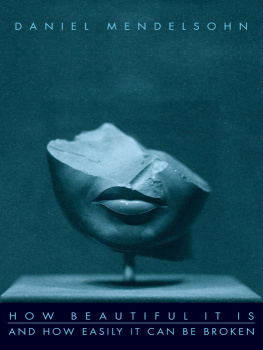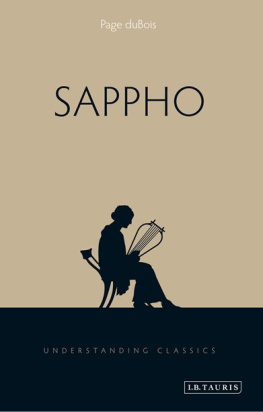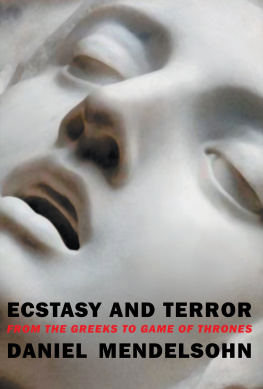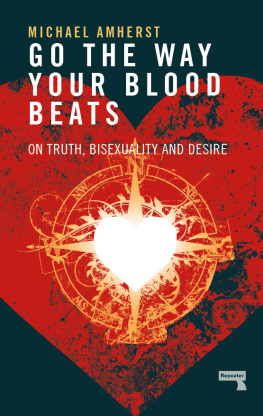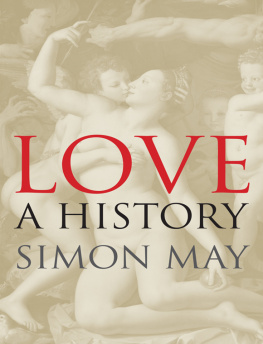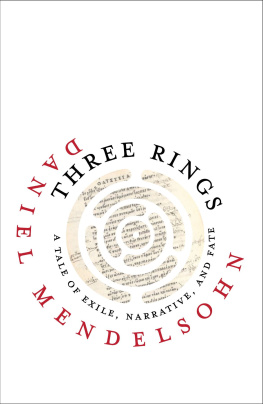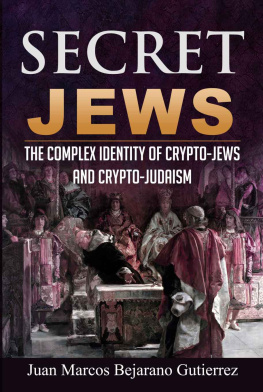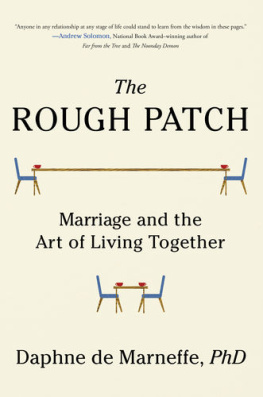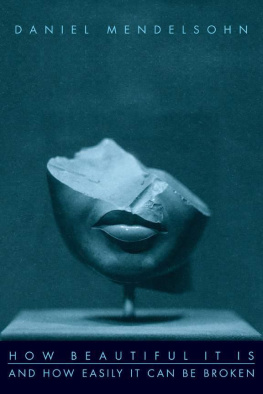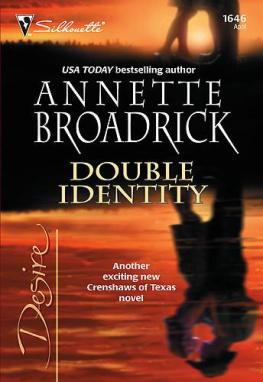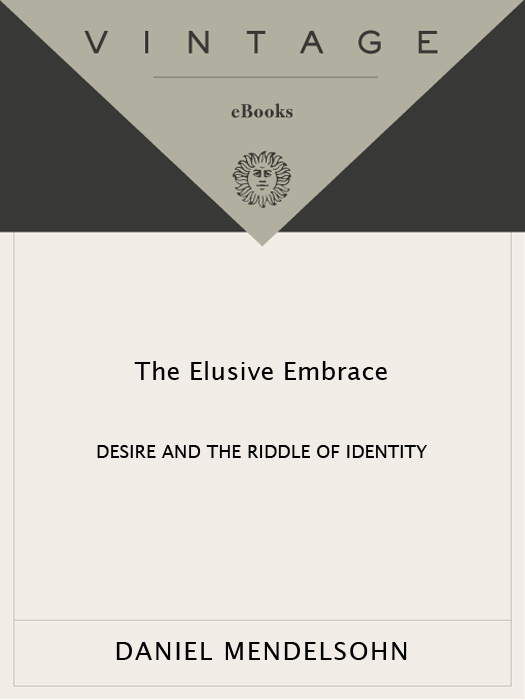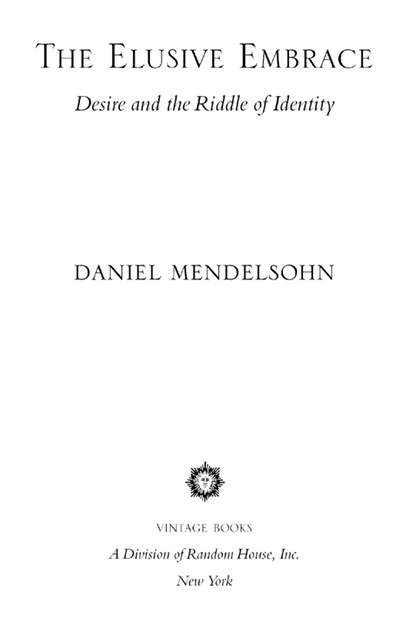Acclaim for DANIEL MENDELSOHNs
T HE E LUSIVE E MBRACE
Brainy and beautiful. A meditation on the double lives all of us, to some extent, live. Mendelsohn brings an unpolemical intelligence and astonishing erudition to his task. The pleasure of this book is the pleasure of following an original mind making connections and discoveries previously unarticulated. He writes with such elegant Apollonian style and bracing honesty that even his most Dionysian recollections steer clear of self-indulgence. Its a one-of-a-kind bookwise, startling and wonderfully unclassifiable.
Newsweek
A literary achievement of the first rank astonishing. The book defies categorization. Mendelsohn has attained a degree of self-knowledge worthy of those ancient Greeks who inspired him. The Greeks knew how to give a universal significance to individual experience. So does Daniel Mendelsohn.
The New York Observer
[A] charming aperu-filled memoir. Daniel Mendelsohn has spread his desire out over geographical space, and has organized his life around enigmatic inscriptions and mythic tales of ordinary life. He establishes a new myth for himself: that of a gay, Jewish Oedipus, willing to pursue the meaning of his oracle wherever it may lead. A personal myth about undoing family myths.
The New York Times Book Review
The Elusive Embrace is that rare thing, a genuinely beautiful essay: a musing meditation on gay culture, on Greek language and myth, on his own family life, that is not so much written as braided.
Los Angeles Times Book Review
Mendelsohns sophisticated inquiry into homosexuality, identity, and language is so lovingly integrated into this memoir that intellectual explorations seem to be as much a part of his life as his family and his lovers are. His etymological investigations and his readings of Catullus and Sappho are curiously tender, and make the memoriesof a college love for a beautiful swim-team boy, for instance, or of a trickster grandfathereven more affecting.
The New Yorker
In this symphonic meditation on identity, an autobiography only for lack of a richer word, Mendelsohn uses the grammatical peculiarity of the middle voice in Greek, which he describes as a sort of shimmering synthesis of not quite compatible conditions, as a metaphor for the levels of self within him. Mendelsohn reads himself and the widening spiral around himof family, friends, lovers, society, cultureas a vast and complex text. Aggressively honest, deeply perceptive, and quite beautiful.
The Boston Globe
A brilliant tale of personal discovery.
Interview
It is difficult to believe that this is Mr. Mendelsohns first book: there is a lifetime of thinking in it that hints at his having written a great many more. Mr. Mendelsohn does not have an ounce of self-pity on his learned bones, which means that it is a pleasure to read about his experiences because they are what book reviewers used to call universal without quite knowing what that meant. Daniel Mendelsohn does: he is a citizen of the world. This book is equal to Whitmans Song of Myself, and it is just as edifying and moving and true.
Hilton Als
A startling, intimate and original work. A remarkable tapestry, weaving family and personal memoir, ancient mythology, and a meditation on the meaning of self. Unapologetic, honest and revealing Mendelsohns language is exquisite, and deserves to be savored, word by word, page by page.
Minneapolis Star Tribune
The Elusive Embrace introduces a unique and irresistible voiceerudite, explicit, tender, and wise. Daniel Mendelsohns personal odyssey of the double life, with his discovery of fatherhood and its illumination of a profound male identity that transcends traditional categories heralds a new century of sexual understanding. An instant classic.
Elaine Showalter
[This] book offers as intelligible, morally and spiritually honest an explication of what it is like to be a male homosexual in American society today as we are going to find.
The Washington Times
The Elusive Embrace is an eerily beautiful book. Daniel Mendelsohns intelligence, lovely sensibility, and style each deserve the laurel wreath.
Louis Begley
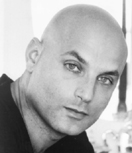
DANIEL MENDELSOHN
T HE E LUSIVE E MBRACE
Daniel Mendelsohn was born on Long Island in 1960, and was educated at the University of Virginia and at Princeton. He is the book critic for New York magazine, and his articles, reviews, and translations have appeared in numerous other publications, including The New York Times, The New Yorker, and The New York Review of Books. A Lecturer in classics at Princeton, he lives in New York City and in New Jersey.
FIRST VINTAGE BOOKS EDITION, JUNE 2000
Copyright 1999 by Daniel Mendelsohn
All rights reserved under International and Pan-American Copyright Conventions. Published in the United States by Vintage Books, a division of Random House, Inc.,
New York, and simultaneously in Canada by Random House of Canada Limited, Toronto. Originally published in hardcover in the United States by Alfred A. Knopf, a division of Random House, Inc., New York, in 1999.
Vintage and colophon are registered trademarks of Random House, Inc.
A portion of Paternities was previously published in slightly different form as Notes from an Unlikely Father in Out magazine.
Some of the names and biographical details in this memoir have been changed.
The Library of Congress has cataloged the Knopf edition as follows:
Mendelsohn, Daniel Adam, 1960
The elusive embrace: desire and the riddle of identity / Daniel Mendelsohn
p. cm.
eISBN: 978-0-307-80987-2
1. Mendelsohn, Daniel Adam. 2. Gay menUnited StatesBiography. 3. Jewish gaysUnited StatesBiography. 4. GaysIdentity. 5. JewsIdentity.
I. Title.
HQ75.8.M46 A3 1999
99-62633
Author photograph Marion Ettlinger
www.vintagebooks.com
v3.1
Contents
I . G EOGRAPHIES
F or a long time I have lived in two places.
One of these places is a quiet street lined with houses whose windows peer out from between wooden shutters at trees and the occasional car, a street in many ways like the nondescript one where I grew up, seething and afraid. When I am in that place, I live in one of those narrow squinting houses with a woman and a small child. I will come to that later.
The other place where I live is in New York City, slightly to the north of gay culture.
Half a block west of my front door lies Eighth Avenue, a one-way, four-lane, north-south artery that carries traffic uptownthat is, north. Eighth Avenue begins far downtown as the much smaller Hudson Street, still paved in places with cobblestones and endlessly subject to obscure and ongoing repairs; down there, it takes you past tiny cross-streets whose numberless names betray their great age, since once you get above the Village, above Fourteenth Street, the later, modern, rigid grid on which Manhattan is laid out supersedes the haphazard and twisted and ancient streets to the south. The grid is, for the most part, easy: its longitudinal lines are all called avenues, their numbers increasing as you go from east to west (with a few famous exceptions, like Park and Madison), and its latitudinal lines are streets, whose numbers escalate as you go from south to north. Attempts are occasionally made to impose names on these numberswe are supposed to call Sixth Avenue the Avenue of the Americas, for instance, and someone has rechristened a snippet of West Sixty-fifth Street near Lincoln Center Leonard Bernstein Waybut New Yorkers, always pressed for time, enjoy the brisk and unromantic efficiency of the numbers and ignore the names. In many ways we are a city of people who prefer numbers to names.


